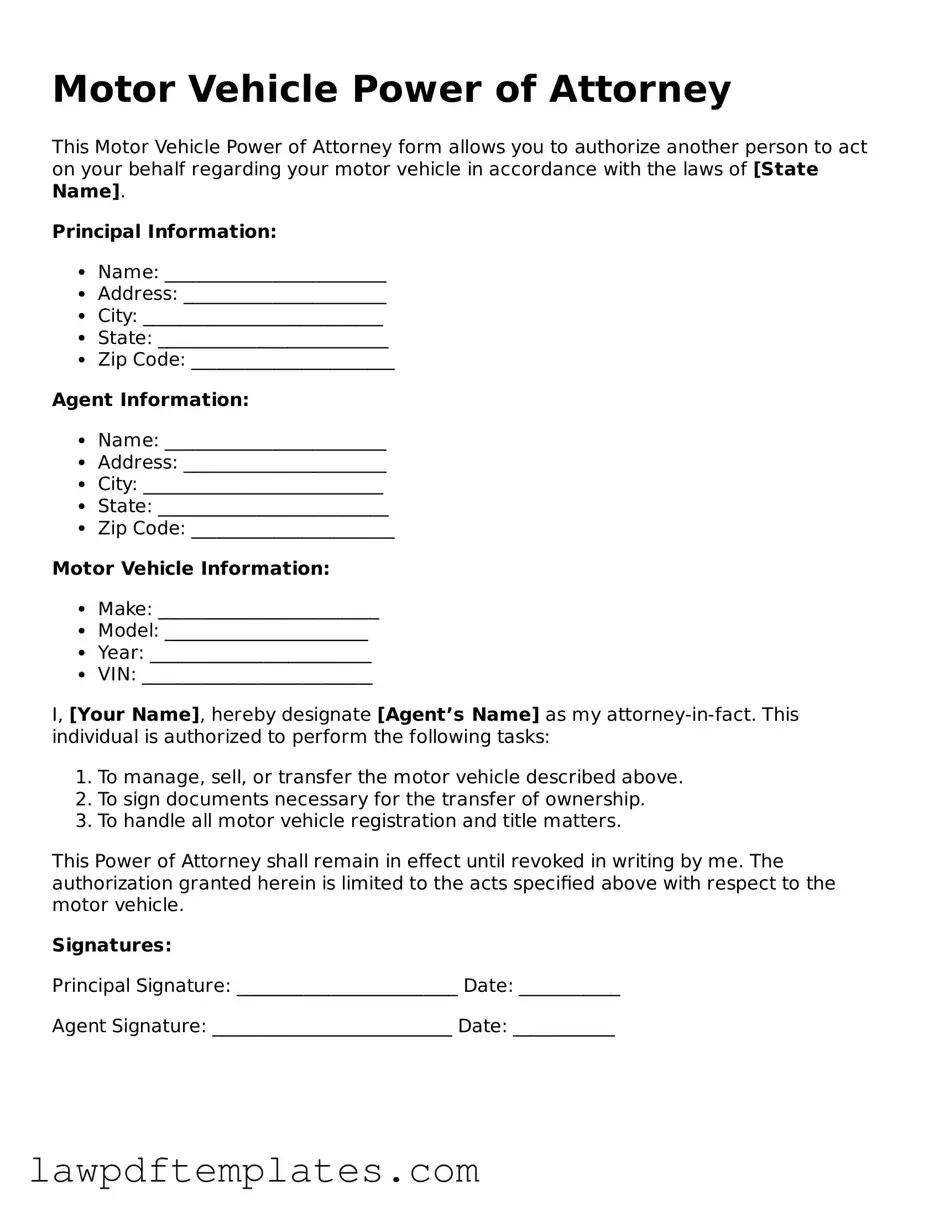Attorney-Approved Motor Vehicle Power of Attorney Document
State-specific Motor Vehicle Power of Attorney Forms
Form Breakdown
| Fact Name | Description |
|---|---|
| Definition | A Motor Vehicle Power of Attorney form allows an individual to designate another person to act on their behalf regarding motor vehicle transactions. |
| Purpose | This form is commonly used for tasks such as transferring ownership, registering a vehicle, or handling title issues. |
| Principal and Agent | The person granting authority is known as the principal, while the person receiving authority is referred to as the agent. |
| State-Specific Forms | Each state may have its own version of the Motor Vehicle Power of Attorney form, governed by state law. |
| Governing Laws | For example, in California, the form is governed by the California Vehicle Code § 5602. |
| Revocation | The principal has the right to revoke the power of attorney at any time, as long as they provide notice to the agent. |
| Signature Requirement | The form typically requires the signature of the principal and may need to be notarized, depending on state regulations. |
| Duration | The authority granted can be limited to a specific transaction or can remain in effect until revoked. |
| Limitations | Some states may impose restrictions on the types of transactions that can be authorized through this form. |
| Use Cases | Common scenarios include selling a vehicle, transferring ownership to a family member, or dealing with estate matters. |
Sample - Motor Vehicle Power of Attorney Form
Motor Vehicle Power of Attorney
This Motor Vehicle Power of Attorney form allows you to authorize another person to act on your behalf regarding your motor vehicle in accordance with the laws of [State Name].
Principal Information:
- Name: ________________________
- Address: ______________________
- City: __________________________
- State: _________________________
- Zip Code: ______________________
Agent Information:
- Name: ________________________
- Address: ______________________
- City: __________________________
- State: _________________________
- Zip Code: ______________________
Motor Vehicle Information:
- Make: ________________________
- Model: ______________________
- Year: ________________________
- VIN: _________________________
I, [Your Name], hereby designate [Agent’s Name] as my attorney-in-fact. This individual is authorized to perform the following tasks:
- To manage, sell, or transfer the motor vehicle described above.
- To sign documents necessary for the transfer of ownership.
- To handle all motor vehicle registration and title matters.
This Power of Attorney shall remain in effect until revoked in writing by me. The authorization granted herein is limited to the acts specified above with respect to the motor vehicle.
Signatures:
Principal Signature: ________________________ Date: ___________
Agent Signature: __________________________ Date: ___________
Common mistakes
Filling out a Motor Vehicle Power of Attorney form can seem straightforward, but many individuals make common mistakes that can lead to complications. One prevalent error is failing to provide complete information about the vehicle. It is essential to include the vehicle identification number (VIN), make, model, and year. Omitting any of these details can render the document ineffective, as it may not clearly identify the vehicle involved.
Another mistake often seen is not signing the form correctly. Signatures should match the names printed on the document. If the form is signed by someone other than the principal, it may be deemed invalid. Additionally, witnesses or notarization requirements vary by state, and neglecting to follow these guidelines can further complicate matters.
People also frequently overlook the importance of specifying the powers granted to the attorney-in-fact. A vague description can lead to misunderstandings or disputes later on. It is crucial to clearly outline what actions the attorney-in-fact can take regarding the vehicle, whether it be selling, transferring, or registering it. Clarity ensures that the principal's intentions are honored.
Lastly, individuals sometimes fail to consider the timing of the form's effectiveness. Some may believe that the Power of Attorney is immediately active upon signing, but this is not always the case. Understanding whether the document is durable or non-durable is vital. A durable Power of Attorney remains effective even if the principal becomes incapacitated, while a non-durable one does not. This distinction can significantly impact the ability to manage vehicle-related matters during critical times.
Consider Popular Types of Motor Vehicle Power of Attorney Documents
Real Estate Power of Attorney Template - It's a crucial consideration for anyone with substantial property holdings or complex transactions ahead.
A Virginia Motor Vehicle Bill of Sale form is a legal document that records the sale and transfer of a vehicle from one party to another. This form serves as proof of ownership and includes important details about the vehicle and the transaction. For those looking to obtain the form conveniently, you can find it at PDF Documents Hub, ensuring you have all the necessary information to complete the transfer smoothly.
Power of Attorney Florida for Child - The form keeps parents in control while allowing for necessary flexibility in caregiving.
